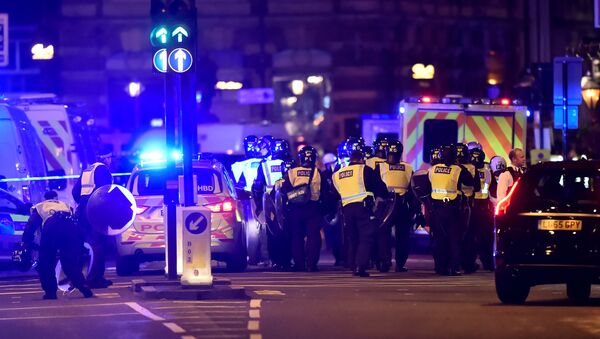Daesh posted a statement on its propaganda page claiming responsibility for the deadly June 3 terror attacks, which saw three Islamist extremists plow a van into pedestrians on London Bridge, after which they drove to Borough Market and engaged in a deadly stabbing attack there. Before being identified, confronted and shot dead by police, the terrorists managed to kill seven people; another 48 were injured. 12 suspects, including four women, have since been detained over the attacks.
After the London attacks, Prime Minister Theresa May said that her country could no longer tolerate extremism, and promised to step up the fight against Islamist terrorism.

Radio Sputnik spoke to Dr Paul Rogers, professor emeritus in peace studies at the University of Bradford, about the causes behind the terror attacks, and why it is so difficult for security services to deal with the primitive nature of these attacks.
Daesh, Rogers said, is currently trying to promote "as many attacks as it can on what it terms the far enemy. Those are states that opposed it in different forms from Europe and North America. The states that it is most interested in focusing on are Britain, France, Germany, to some extent Belgium, Russia of course with the St. Petersburg attack, and essentially the aim is to try and encourage, incite, and sometimes even directly organize attacks, sometimes by people [inside] the country, occasionally by people coming in from outside."
The trend for staging these kinds of attacks against civilians in the 'far enemy' is something that has emerged specifically over the last two and a half years, the academic recalled. Before that, "for the first two of the five years that ISIS has existed, it was far more concerned with establishing its own geographical caliphate. Once the Western coalition formed and you had the air war starting against it three years ago, then it developed an additional tactic of trying to take the war back to the countries waging war against it."

Rogers emphasized that these attacks have at least three central aims, including demonstrating the capabilities of ISIS loyalists, and exacting 'revenge' or retaliation for the loss of tens of thousands of fighters who have been killed in the Middle East.
"Thirdly, they are about trying to damage the society in the 'far enemy'. They want to stir up more Islamic hatred, more political dissention, and they like it when countries have considerable political difficulties," the academic added.
In any case, Rogers emphasized that putting aside for a moment the specific tactics used by the terrorists, "this has to be understood as part of a wider theme which relates very much to the nature of the war in the Middle East, particularly the losses which the Islamic State has suffered in the last two and a half years."
Asked what policies British authorities might adopt to help contain the further spread of terrorism, Rogers admitted this was a very difficult problem, particularly in light of the dual problem faced by the UK as far as terror is concerned.
"You have a double problem in Britain in that the person who attacked the youngsters coming out of the pop concert in Manchester – they were attacked by somebody who was part of a wider cell," the observer noted. But "the risk is that you have individuals and maybe 2-3 people together deciding to do this much cruder attack [London] which does not involve any technology – does not involve getting explosives, but simply involves hiring a truck and having knives. That is very difficult to counter," he added.
Thankfully, the observer noted that within the Islamic communities in Western European countries, the number of radicals who are actually willing to commit such acts of terror is extremely small. "One suspects that quite a few of them are picked up, with authorities informed, often by people in their own communities."
Ultimately, Rogers emphasized that while more can certainly and must be done to prevent such attacks in the future, "one also has to understand that what is happening is part of a much wider international picture; unless we can appreciate that, getting to the grips of it is going to be very difficult. I see very little political sign of doing that at present, but that is what is going to be necessary."






